

"We need to use every tool at our disposal"
Deutsche Telekom and EWE are founding a fiber-optic joint venture called "Glasfaser NordWest", aimed at driving the fiber-optic build-out forward in northern Germany. An interview with Dirk Wössner, Managing Director of Telekom Deutschland, and Dido Blankenburg, responsible for broadband cooperation at Deutsche Telekom.
Dr. Wössner, you signed the contract for the formation of "Glasfaser NordWest", together with EWE. Why did you decide to take this step?
Dirk Wössner: Deutsche Telekom is Germany's digitalization engine. We're now shifting into a higher gear, together with EWE. Glasfaser NordWest will build new fiber-optic networks faster and more comprehensively than either company would be able to do on its own. In the coming ten years, Deutsche Telekom and EWE will invest around two billion euros in the new company together. This time frame only refers to the planned investments, however; our goal is a long-term partnership. Together, we aim to provide up to 1.5 million households and business locations in northern Germany with fast internet. As you know, broadband expansion is very expensive and complex, in both its planning and construction. That's why we are partnering with EWE to capture synergy effects. People and companies in rural areas will particularly benefit from this.
In the media information, the two companies announce that they will "offer the services from the new infrastructure to all interested companies at commercial terms." What does that mean specifically?
Dido Blankenburg: The business purpose of Glasfaser NordWest is to provide optical fiber in open competition, without discrimination. The joint venture will build and operate a FTTH network. The product it sells will be upstream services for telecommunications companies. End customers can then purchase a fiber-optic line from EWETEL or Deutsche Telekom. The joint venture will offer its upstream services to all providers to consumers at the same conditions. The telecommunications companies can choose whether they wish to participate in the build-out with a fixed quota, which will earn them a discount, or purchase each line separately. This means there is a co-investment model for three. For consumers, this means maximum FTTH build-out plus maximum provider selection. The main product will be layer 2 bitstream access. In addition, Glasfaser NordWest will offer layer 3 bitstream access for customers that cannot use layer 2 bitstream access due to technological constraints. This means the future company will not market any services directly to end customers. But the key factor is: With Glasfaser NordWest, we are creating a new commercial proposal for other companies to actually build out optical fiber together. However, this offer is based on an assumption that the other companies will also make their contribution to the actual costs of the infrastructure. Today, we registered Glasfaser NordWest with Germany's Federal Cartel Office. The founding of the company is planned for this summer.
Does Deutsche Telekom plan to found similar companies together with other partners?
Dido Blankenburg: We are interested in many different forms of collaboration. We need these new forms of collaboration to digitalize Germany. As such, we're not limiting ourselves to our own build-out efforts, regardless of whether they're funded internally or with external subsidies. We are also increasingly relying on collaboration with other companies, for example, with partners in the Stuttgart "gigabit region". We plan to build out optical fiber, 5G, and mobile networks there by 2030. We are expanding the network together with Telefonica, for example, whose cell towers we have connected to our fiber-optic network for some time now. The joint venture with EWE is another example. No two collaboration projects are alike. Interests, market potential, and technologies vary – even significantly at times.
Dirk Wössner: Digitalizing Germany and hooking up as many people and companies as possible: that's one of the greatest challenges of our time. And the best way to tackle this challenge is to use every tool we have at our disposal. It wouldn't be wise to rule out anything in our choice of strategic tools. In this case, it makes sense to set up a joint venture. It's a clear signal: we're upgrading Germany. Pragmatically, not dogmatically. With partners, not by ourselves.
Dr. Wössner, Dr. Blankenburg, thank you for the interview.
Personal details Dr. Dirk Wössner, born 1969, joined the Board of Management of Deutsche Telekom on January 1, 2018, where he is responsible for the sales, marketing, and service of fixed-network and mobile products for consumers and business customers in Germany. He also serves as Managing Director of Telekom Deutschland GmbH. Wössner previously worked at Rogers Communication, a Canadian telco, where he was responsible for consumer business starting in April 2015. Prior to his move to Canada, Dirk Wössner had held a variety of management positions at Deutsche Telekom from 2002 to 2012, most recently Director of Sales for consumers and business customers in Germany.
Dr. Dido Blankenburg, born 1970, was appointed Representative of the Deutsche Telekom Board of Management for Broadband Cooperation in Germany in November 2018 and is also a member of the management. His previous duties included responsibility for Telekom Deutschland's wholesale activities. Dido Blankenburg has extensive knowledge of the market from his positions at Mannesmann, Vodafone, and AOL.


